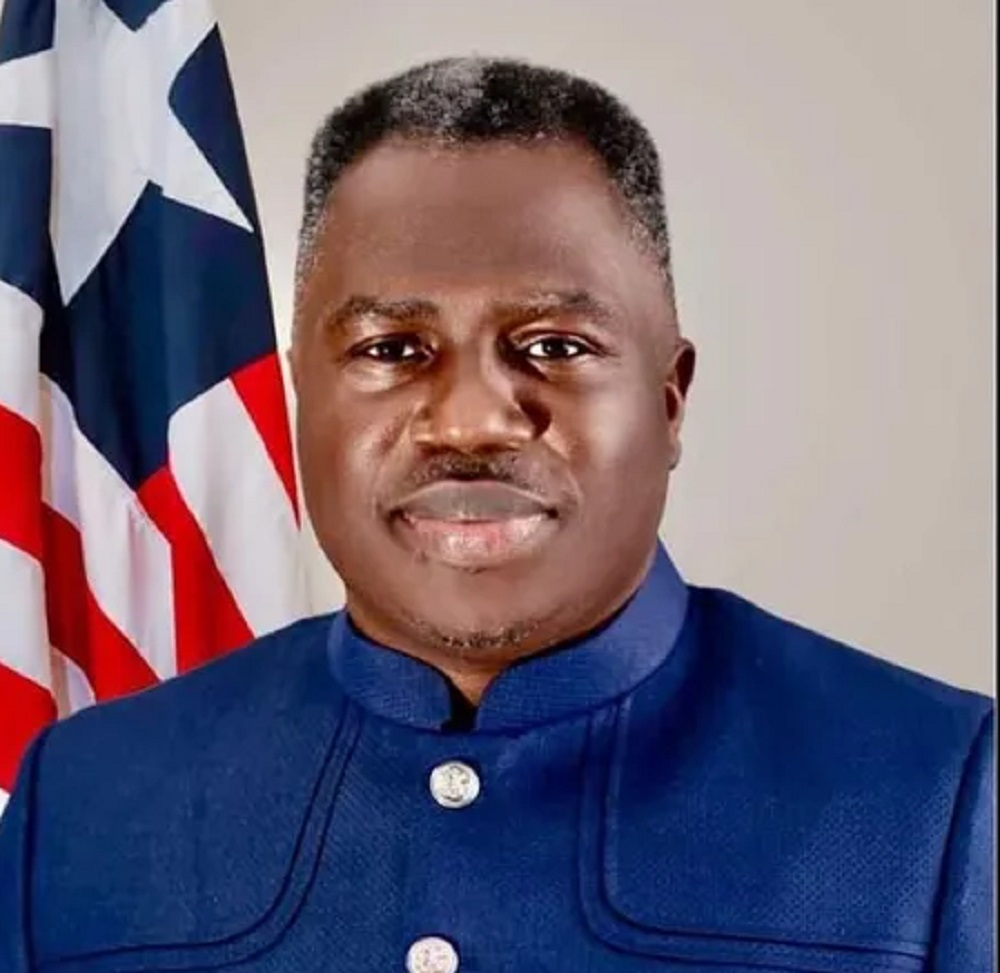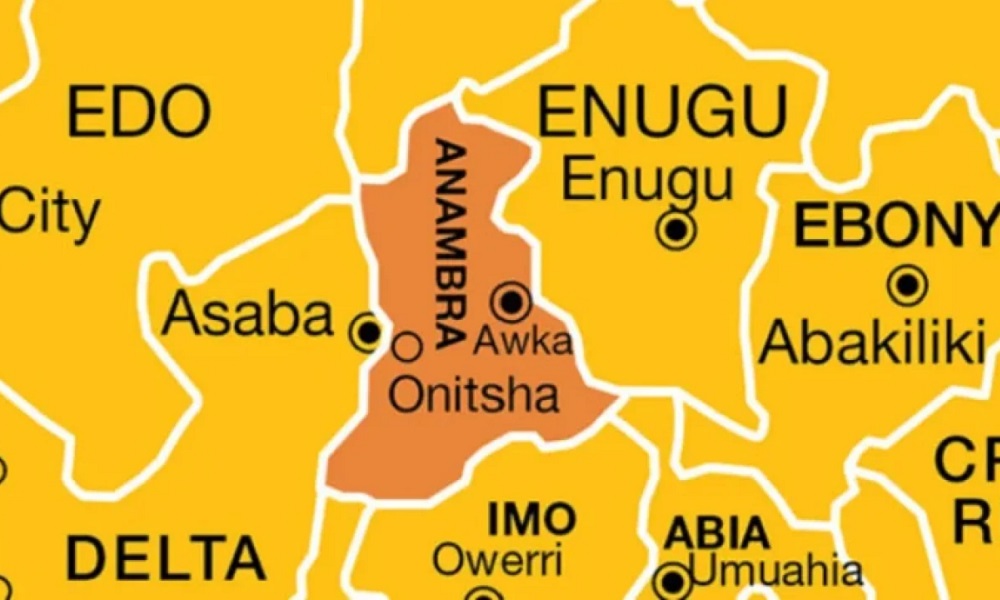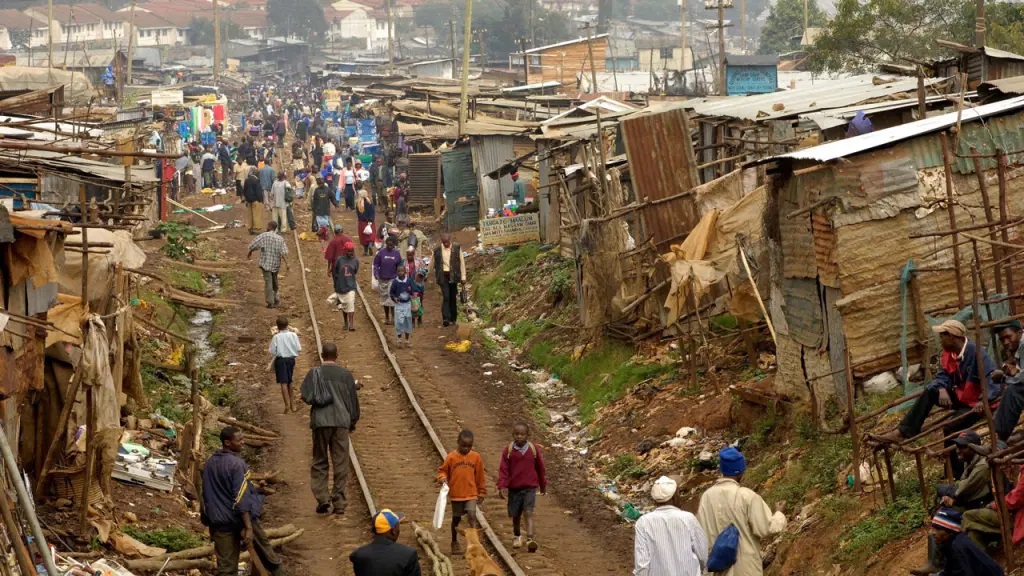News
Revealed: Powerful Nigerians own four commercial banks in our country-Liberia’s VP

Liberia’s Vice President, Jeremiah Kpan Koung, has said that Nigerians now own about half of Liberia’s commercial banks.
He said this during the 17th Annual Banking & Finance Conference organized by the Chartered Institute of Bankers of Nigeria (CIBN) in Abuja on Tuesday.
Koung, speaking to an audience of banking professionals and government officials, praised the role Nigerian banks play in Liberia’s economic landscape.
He emphasized that Nigerian investors have been instrumental in increasing market competition, boosting efficiency, and providing credit lines to support private sector growth.
The Liberia’s Vice President said: “We welcome and applaud the expansion of Nigerian-owned banks in Liberia. The presence and increase in Nigerian-owned businesses, especially banks, are helping to increase market competition and improve efficiency.
“These banks continue to play major roles in providing jobs and establishing credit lines to support the development of our private sector. Presently, there are four (4) Nigerian-owned banks operating in Liberia out of a total of eight (8) commercial banks. This is a clear sign that Nigerians remain interested in investing in Liberia, and as a government, our doors remain open to you.”
He expressed his government’s openness to further investment from Nigerian banks, noting their critical role in job creation and economic development.
Koung also touched on Liberia’s efforts to integrate into the West African Monetary Zone and the Economic Community of West African States (ECOWAS), with a vision to adopt a single currency regime.
He explained that the Central Bank of Liberia is working on a new monetary policy framework that will align with the region’s economic integration goals. However, Koung warned that achieving this vision will require collective economic responsibility from all member states, including managing debt and stabilizing exchange rates.
Koung said: “Currently, the Central Bank of Liberia is working on the monetary policy framework to meet the requirements for the West Africa Monetary Zone. As you may be aware, it is expected that Liberia, Ghana, Gambia, Guinea, Sierra Leone, and Nigeria will work towards the implementation of a single currency regime to achieve economic integration.
“This policy framework will lay the foundation for the realization of a common currency for all ECOWAS member states. However, to achieve this vision, we have a collective responsibility to make sound economic decisions to reduce our debts and stabilize our exchange rates.”
The vice president further emphasized the need for investment banks in Liberia, noting that the country’s only development bank, the Liberia Bank for Development and Investment (LBDI), lacks the capital necessary to finance the country’s ambitious economic transformation agenda.
As a result, Liberia has had to rely on multilateral development institutions like the African Development Bank and the World Bank to finance large-scale projects. Koung called for more investment in Liberia’s banking sector to address this gap.
In his closing remarks, Koung expressed optimism that the Abuja conference would inspire new policy directions to enhance the banking sectors in both Nigeria and Liberia.
He highlighted the potential for greater collaboration between the two countries, particularly in the areas of trade, investment, and financial services.
However, checks on the website of Central Bank of Liberia (CBL) showed that there are nine commercial banks in Liberia.
The four linked to Nigerians are Ecobank Liberia Limited (EBLL), United Bank for Africa Liberia Limited (UBALL), Access Bank Liberia, and Guaranty Trust Bank Liberia (GTBL).
The other five banks in Liberia are Liberian Bank for Development & Investment (LBDI), International Bank Liberia Limited (IBLL), Global Bank Liberia Limited (GBLL), Sapelle International Bank Liberia Limited (SIBLL), and Afriland First Bank LIBERIA Limited (AFBLL).
News
Sad! Abductors k!ll female banker after collecting ransom, dump corpse along Anambra road

Suspected kidnappers have reportedly k!lled a banker identified simply as Ifeoma, after ransom payment in Anambra State.
Details of the incident are still sketchy at the time of filing this report but it was gathered that the deceased was abducted in Onitsha.
Human rights activist, Harrison Gwamnishi, who confirmed the incident in a Facebook post on Tuesday, January 14, 2025, said ransom was demanded and the family paid but her abductors still k!lled her and dumped her body around Ideani junction, along Nnobi/Alor road.
“Lives are being taken daily and it’s sad nothing is being done to end all this k!llings. WHO IS NEXT? If we keep fold our hands and do nothing, it may get to you,” he added.
News
Nigeria beats 4 countries in global quality living, ranked 135th out of 139

Nigeria is missing in the top spot for countries that offer their citizens the best quality of life, according to the latest Quality of Living Index by Global Citizen Solutions.
The report ranked Nigeria 135th out of 199 countries, with an overall score of 54.1, making the country unattractive for people looking to shift base from their home countries, probably due to adverse effects of climate change, economic opportunities and persecution or large-scale human rights violations, among others.
The rating, which took into consideration the availability and cost of day-to-day amenities, such as infrastructure, cost of living, personal and political freedom, environmental quality and attitudes towards foreigners, comes on the backdrop of the harsh economic condition in Nigeria and reflects the current cost of living crisis in the country.
The report scored Nigeria low in both the standard of living of the population and pursuit of attainment of the United Nations’ 17 Sustainable Development Goals, SDGs, while it scored the country partially free in terms of protection of personal freedom.
The country scored very low in environmental quality and very high in migrants’ acceptance.
At 54.1, Nigeria comes behind African countries such as Namibia (87th), South Africa (88), Tunisia (90th), Ghana (91st), Seychelles (101st), Morocco (103rd), Senegal (106), Botswana (107), Algeria (108) and Cote d’ Ivoire at 115th, among others.
It bested countries like Maldives, Libya, China, Brunei, Venezuela, Sierra Leone, Egypt, Qatar, Saudi Arabia, and Gabon in overall quality of living standards.
Meanwhile, European countries such as Sweden, Finland, Germany, Denmark and Spain emerged in the top five on the list.
The report said: “The Quality of Living Index looks at the overall quality of life a country offers. For the Quality of Living dimension, the goal set was to assess how good life is in the country as a permanent/primary place of residence for expats, retirees, and anyone seeking desirable living conditions abroad.
“The set of orienting questions was: What is the overall level of human development/general population quality of life? How happy is the country’s population? How good is healthcare? How affordable is good healthcare? How safe is living in the country? How good is education? How good is it as a travel hub? What is the level of freedom experienced by the country’s population?
“Several thematic areas were prioritized, and research was undertaken to identify reliable data sources with comprehensive country coverage.
Six main weights of indicators are included in the index, including SDG (30%), Cost of Living (20%), Freedom in the World (20%), Happiness Score (10%), Environmental Performance (10%), and Migrant Acceptance(10%).”
News
Discover the regions on Earth where snakes are not found

Snakes are the most versatile species, with over 3,000 species, and are found on almost all continents and almost in all kinds of environments from deserts to rainforests. They can thrive in most climates and various habitats. According to the reports, there are many parts of Earth that exhibit a remarkable absence of snakes, and this can be attributed to various factors such as geographic isolation, extreme climatic conditions, or adverse environmental conditions that make survival hard for them. The regions themselves are an exception to the rule since the conditions here cannot favor the existence of snakes.
Some such areas include Antarctica, New Zealand, Ireland, and most of the Pacific islands. In many of these regions, strong laws and the natural barriers in place have resulted in snakes never establishing themselves to begin with; thus, one finds unique ecosystems in danger of introduction of non-native species otherwise. Explore more about the places where snakes are not found.
Snake-free places on the Earth
Antarctica
Antarctica is the only continent that is snake-free on Earth as per reports. This is because the continent has an extremely cold climate. Thus, Antarctica is inadmissible for the snaky reptiles that are cold-blooded. Snakes are ectothermic, meaning that they regulate their body temperature through external sources of heat. Snakes could not survive in Antarctica since the environment has ice and snow, and the extreme coldness is such that reptiles would not be able to find warmth for them to work.
Antarctica does have other wildlife including seals, penguins, and marine mammals. However, this list does not include reptiles, which snakes belong to.
New Zealand
New Zealand is one of the very few countries in the world that is entirely snake-free, which is because it is relatively isolated in the South Pacific. Geographically, New Zealand is separated by huge oceans, and isolation did not allow snakes to naturally migrate to the island nation. Although sea snakes, including the Yellow Lipped Sea Krait and Yellow-Bellied Sea Snake, can occasionally be seen in the waters around New Zealand, they do not live on land.
New Zealand has very strict laws regarding the importation and keeping of snakes within the country, whether as pets or in zoos. This is to preserve the unique ecosystem of the country and to avoid any ecological imbalance that might be caused by the introduction of non-native species.
Ireland
Ireland is also one country that has no snakes, and fossil records show that snakes never colonized the island. Snakes are absent in Ireland because of its chilling climate and historical geographical separation from the main lands on the continent according to the reports. Snakes in their nature need warmer climates to conserve their body temperatures because Ireland has a temperate climate that is not healthy for snakes to survive. Snakes are not native to Ireland; however, some species exist in zoos or kept as pets but don’t occur naturally.
It is so interesting and mythical that snakes have never been found in Ireland, where popular legends or stories explain that might have been due to a historical event or because of Saint Patrick’s influence.
Greenland
Greenland is an Arctic country with no native snakes. Because it’s not favorable due to its unfriendly climate, long winters, and little sunshine that the snake species don’t find friendly because snakes are cold-blooded animals surviving well in warm conditions. Even though there is no snake species known to be originally found in the country of Greenland, people are permitted to keep domesticated snakes under local authority permissions.
This has resulted in stringent laws on importing and even owning the exotic pets to conserve the sensitive ecosystem of the Arctic and not have the alien species disturb the fragility of the ecosystem in that area.
Iceland
Snakes can’t be found in Iceland because the weather is extremely unforgiving and biting. Geothermal activities coupled with volcanic soil make most of the reptiles inapplicable to the environment of the island. However, there are some that call the sand snakes of Iceland. Actually, these are not snakes but mere wind formations on sand. Snakes could not survive the cold environment of Iceland, and no record of snakes exists in this island, neither as a native species nor an established population.
Alaska
Alaska, being very much north, lacks native snake populations. The winters are long, and the light is scarce here, making the survival of the cold-blooded animals like snakes extremely difficult. There have been instances of nonnative snakes, but they are a result of escapes from pets in some cases; they are never established populations. Snakes cannot be seen throughout the year in this harsh environment, and the only reptile species in Alaska is the sea turtle, which lives in warmer ocean waters. There are no snakes in Alaska because the state has a cold climate and there is no place there where snakes might live.
Hawaii
The other snake-less place is Hawaii. Hawaii is a group of islands located in the central Pacific. Snakes cannot access these islands through geographical isolation. The surrounding ocean barriers contribute majorly to how snakes do not reach these islands. Although some sea snakes occasionally appear offshore of Hawaii; they are non-land reptiles. Hawaii has also established very strict laws banning the importation and possession of snakes as it strives to protect its delicate ecosystem and ensure no non-native species is introduced into the system to cause a mismatch of the native wildlife.
Cook Islands
According to the reports, no snakes are found in Cook Islands, South Pacific. Isolation is one aspect that has seen many of the islands in the Pacific have no snakes. The flora and fauna diversity present on the islands vary from those of areas that comprise snakes. In the Cook Islands, the uniqueness of the place from the ecologic perspective emanates from their snakeless characteristic.
Cape Verde
Cape Verde is an island country off the west coast of Africa. It has no native species of snakes in its islands and is one of the few regions without snakes. Apart from having no snakes, Cape Verde has few venomous animals, making it a relatively safe destination for travelers. It has become a favorite tourist destination for people who want to have a snake-free holiday because of its lack of snakes and other dangerous wildlife.
Pacific Islands
Apart from the Cook Islands and Cape Verde, there are many other Pacific Islands, including Tuvalu, Nauru, Kiribati, and the Marshall Islands, which are snake-free. This is because the islands have isolated ecosystems that have never been colonized by snakes. Though some of the islands have sea snakes in their surrounding waters, they do not have any native land snakes on them. Geographically, the regions are cut off, so snakes cannot naturally migrate there.
Snake-free regions on Earth highlight the fascinating interplay between geography, climate, and ecological balance. From Antarctica’s icy terrain to the isolated Pacific islands, these places remain untouched by snakes, offering unique ecosystems and insights into the adaptability of wildlife. Whether due to natural barriers or stringent conservation laws, these areas provide a safe haven from snakes, making them intriguing destinations for those seeking a reptile-free environment.
Credit: timesofindia.indiatimes.com
-

 News19 hours ago
News19 hours agoWike bans ‘pantekas’ for two weeks in Abuja
-

 Economy19 hours ago
Economy19 hours agoSEE Dollar (USD) to Naira Black Market Rate Today January 14, 2025 Aboki
-

 News19 hours ago
News19 hours agoPregnant lady sets ablaze husband’s suspected side chic
-

 News12 hours ago
News12 hours agoDefence Ministry Solicits Additional N20bn Families Of Deceased Military Personnel
-

 News12 hours ago
News12 hours agoNASS constitutes joint committee to probe N4trn revenue shortfall
-

 News19 hours ago
News19 hours agoPSC sacks two police officers, demotes six for alleged corruption, others
-

 News18 hours ago
News18 hours agoFear grips Special Counsel who led prosecution against Trump, runs away from US
-

 News20 hours ago
News20 hours agoM!ssing lady found d£ad in her Asaba apartment








